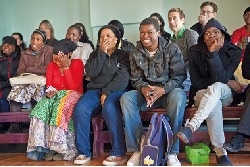May 2017 Research, Science and Knowledge
Read the articles selected in May 2017
University researchers key “in 40% of top inventions since 1950s”
by Ellie Bothwell
Source: Times Higher Education, 21 May

Despite the low share of total research funding awarded to universities, in the 50 top inventions between 1955 and 2005 academics played important roles in all phases of discovery and development. State funding was essential for the majority of innovations.
Read more:
https://www.timeshighereducation.com/news/university-researchers-key-40-top-inventions-1950s
New EU directive set to ease rules on text and data mining
by David Matthews
Source: Times Higher Education, 23 May

A new EC directive intends to fill the certainty gap about the legality of text and data mining for European researchers. Even if the right to access is guaranteed, the copyright rules in our continent enable much too narrow exemptions, especially for researchers working in public-private partnerships.
Read more:
https://www.timeshighereducation.com/news/new-eu-directive-set-ease-rules-text-and-data-mining
Realizing the Promise of Education for Development
Source: http://www.worldbank.org
This Report aims to provide guidance on education reforms in the world, to better learning outcomes worldwide. The promise of education requires systemic interventions, within and outside the education institutions. Learning metrics are useful in the assessment of the acquired skills.
Read more:
http://pubdocs.worldbank.org/en/122551487107699968/WDR2018-Themes.pdf
Key competences for Lifelong Learning
Source: http://www.eua.be, May 2017
The EC has presented its reviewed Framework of Key competences for Lifelong Learning, functional to the advancement of European society and to the citizens’ personal development. EUA highlights the importance of humanistic and social competences for understanding the increasingly complex and global world.
Read more:
The price of being a postdoc
by Devin Powell
Source: Science, 10 January

Biomedical postdocs have to know that if they don’t accomplish an academic career pay the time spent doing research with a wage gap for several years. After a 2016 study, the postdoc doesn’t help to get a good job in the industry, although it can deliver other nonfinancial benefits.
Read more:
http://www.sciencemag.org/careers/2017/01/price-doing-postdoc

The Learning Generation
Source: http://report.educationcommission.org
The International Commission on Financing Global Education Opportunity, formed to raise international funding levels for education, proposes an agenda for a synergic action for the ever realized largest expansion of a quality primary and secondary education by 2030.
Read more:
http://report.educationcommission.org/wp-content/uploads/2016/09/Learning_Generation_Full_Report.pdf

Skills and global value chains
Source: http://www.oecd.org/, 4 May
In a time when the benefits of globalization are being questioned, investing in the skills of their populations represents for countries the opportunity to ensure better economic and social outcomes, and for individuals the capacity to face the risks related to global value chains.
Read more:

Women must be at the heart of the digital revolution
Source: https://www.weforum.org
No nation can rise without gender equality. The rights of women are accomplished with the access to the means of economic prosperity. In the coming Fourth Industrial Revolution, this means to become digital fluent, what could realize their independence both in developed and in developing nations.
Read more:
https://www.weforum.org/agenda/2017/05/women-must-be-at-the-heart-of-the-digital-revolution

Strategy Report on Research infrastructures
Source: http://ec.europa.eu
The ESFRI Research Infrastructures of pan-European interest are accessible facilities, resources, and infrastructures devoted to top-level research. Involving all Member States and Associated countries to the EU Framework Programmes for Research and Innovation, the Ris play a key role in developing European competitiveness.
Read more:
http://ec.europa.eu/research/infrastructures/pdf/esfri/esfri_roadmap/esfri_roadmap_2016_full.pdf
Young University Rankings 2017: results announced
by Ellie Bothwell
Source: Times Higher Education, 5 April

THE Young University Rankings 2017, that classify the world’s 200 best universities, 50 years old or younger, include our university placed at number 92. The data show that young universities are more internationally focused, and are characterized by openness and interdisciplinarity
Read more:
TRENDS 2018 survey: learning and teaching at European universities
Source: http://eua.be, 4 May
After the 2015 EUA TRENDS report, which monitored the changes in the perception of learning and teaching as institutional priorities in the European universities, the EUA has launched a project for teaching enhancement and pedagogical training as well the first European Learning and Teaching Forum.
Read more:
http://www.eua.be/Libraries/higher-education/trends-2015.pdf?sfvrsn=0
Students today, leaders of globalisation tomorrow
by Danny Quah
Source: University World News, 5 May

Students, who are the next generation of global leaders, are to be taught about globalization with an approach more focused to those who have lost in its process, to demonstrate that the advantages clearly outweigh the disadvantages in the balance of world’s powers and in the international economic development.
Read more:
http://www.universityworldnews.com/article.php?story=2017050213134983
How to surf the new wave of globalisation
by Andreas Schleicher
Source: http://www.oecd.org/ 4 May

Globalisation has radically altered the nature of work: the workers left behind in OECD countries are 200 million, what urges from one side to spot the right skills connecting the world of learning with the world of work, from the other side to remove socioeconomic barriers to lifelong learning.
Read more:
http://oecdeducationtoday.blogspot.it/2017/05/how-to-surf-new-wave-of-globalisation.html
The Harvard of Africa? A transcontinental university takes shape
by John Elmes
Source: Times Higher Education, 30 April

An ambitious project to reinvent higher education in the world has taken off in Africa with the African Leadership University, which aims to address the major global challenges, that from Africa will be defined, starting from Africa point of view, and to attract researchers and a 25 % of students from outside the continent.
Read more:
https://www.timeshighereducation.com/news/harvard-africa-transcontinental-university-takes-shape
SDGs and higher education- Leaving many behind
by Savo Heleta & Tohiera Moodien
Source: University World News, 28 April
The SDG number 4, calling in particular “for an inclusive and equitable quality education for all”, focuses primarily on pre-primary, primary and secondary education. But the goal of sustainable development cannot be achieved without strengthening higher education systems in developing countries.
Read more:
http://www.universityworldnews.com/article.php?story=20170427064053237
How science fares in the U.S. budget deal
Source: Science, 1 May

The United States Congress has approved a spending bill that gives National Institutes of Health a 6.2% increase for the fiscal year 2017, funding biomedical research with $2 billion.The Congress is also expected not to agree with the cuts announced by Trump administration for the fiscal year 2018.
Read more:
http://www.sciencemag.org/news/2017/05/how-science-fares-us-budget-deal
Vaccines on trial: U.S. court separates fact from fiction
by Meredith Wadman
Source: Science, 27 April

In the U.S. the court that judges vaccine injury cases for their compensation has adjudicated more than 16.000 petitions and dismissed two-thirds of them. The court’s data show that vaccines are safe, their real risks never include autism and the importance of education about them.
Read more:
http://www.sciencemag.org/news/2017/04/vaccines-trial-us-court-separates-fact-fiction
Working together to build the culture of learning in the Netherlands
by Andreas Schleicher
Source: http://www.oecd.org, 20 April

The small Dutch economy, characterized by a highly skilled working population and the ambition to be a competitive learning economy, shows with its aging population and the increased migration at risk of marginalization, the importance of acquiring, maintaining and further developing the adults' skills.
Read more:
http://oecdeducationtoday.blogspot.it/2017/04/working-together-to-build-culture-of.html
Inclusive innovation policies
by Sandra Planes-Satorra & Caroline Paunov
Source: http://www.oecd.org/, 25 April
With technological change, those most educated have much more opportunities, and those economically disadvantaged are less likely to get an adequate education, to participate in innovation and to emerge. Inclusive innovation and economic policies are complementary to education policies to ensure an inclusive growth.
Read more:

